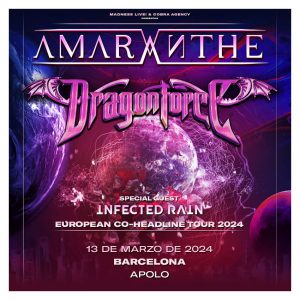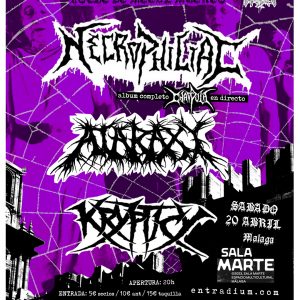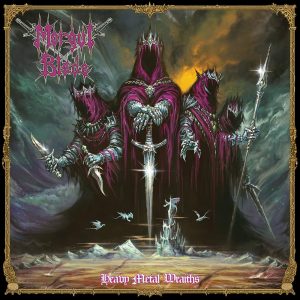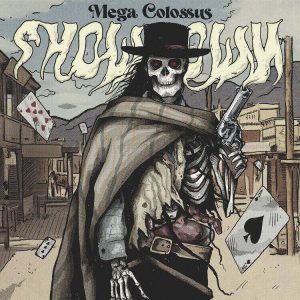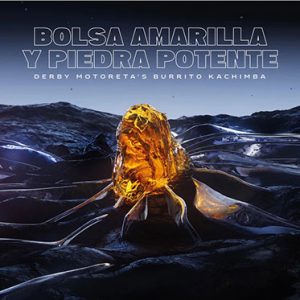MORBUS CHRON (Eng.)
– Hi, thanks for your time. What are you currently up to? How is everything doing right now with the release of your new album?
Hello! We worked on this record for such a long time that it almost felt surreal holding the finished vinyl in your own hands. Right now we’re preparing ourselves for the upcoming tour with Necrowretch. Exciting times.
– After giving «Sweven» some spins I can firmly state yours is one of the hugest musical evolutions I’ve heard in anges, an evolution that started to be more present on the «A Saunter Through the Shroud» EP but, how do you personally think has MORBUS CHRON evolved from the EP to this new full-length?
On the last EP, we started to adapt the mind set that fueled the whole new album. The thought that we could do much more if we would just let go of our stubborn ways and allow ourselves to think outside the box. The biggest difference between the two releases in my opinion is the execution. Everything flows much better on Sweven, and there’s a good balance between soft and heavy, ugly and pretty etc. The songs on ‘A Saunter..’ were maybe less thought through and sometimes filled with too many ideas for their own good. But I still think it’s a great EP. It was clear that we weren’t aiming to settle, which would have been the easy route. So no one should have been surprised that ‘Sweven’ took it even further. From my perspective, it hasn’t been that big of an evolution. That is if you take the aforementioned EP into the equation. Going from Sleepers straight to Sweven, I can understand the leap may seem bigger. For us it has always felt very natural. Simply the next logical step.
– You have matured a lot musically, even lyric-wise so, could you please tell us what do lyrics on this record deal with? «Sweven» is an old English word for «dream», and I think this has a lot to do with the lyrical content here…
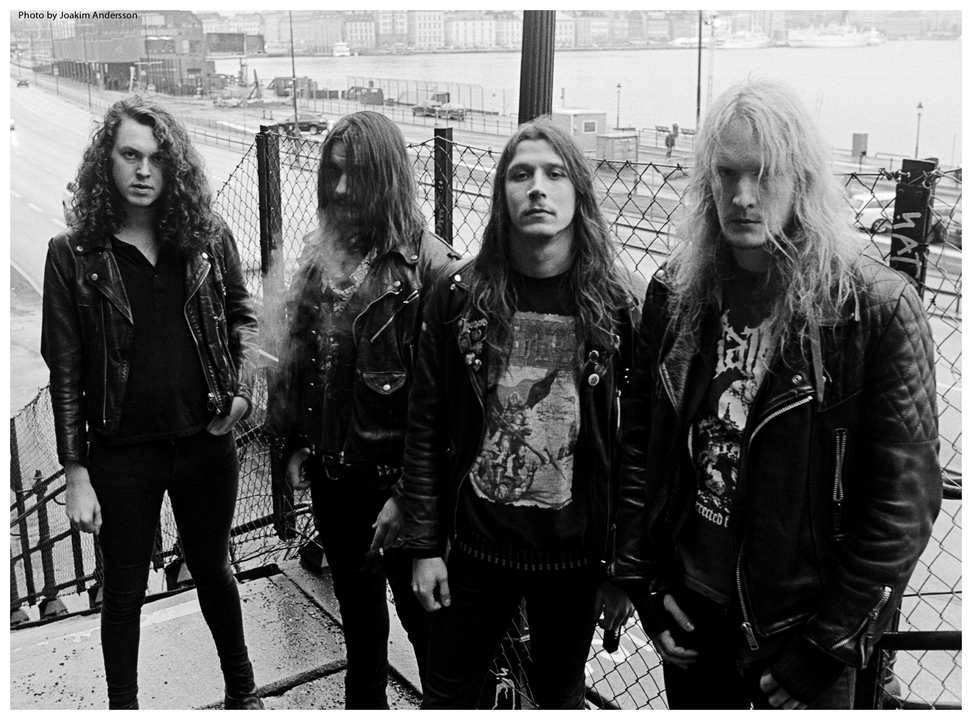 The title pretty much says it all. Everything is based on the concept of dreaming, otherworldly visions and space. It is an album that already paints a pretty clear picture with only the music, and I tried to match the lyrics to that picture. You know, it wouldn’t have felt right howling about necrophilic activities on any of the tracks.
The title pretty much says it all. Everything is based on the concept of dreaming, otherworldly visions and space. It is an album that already paints a pretty clear picture with only the music, and I tried to match the lyrics to that picture. You know, it wouldn’t have felt right howling about necrophilic activities on any of the tracks.
– Anyway you have naver had that typical Swedish DM sound, and now you also add elements from different music genres so, how do you feel when people still put the «Swedish Death Metal» tag on you?
We are Swedish and we play Death Metal, and that seems to be a case closed for many people. But I have to agree with you that we’ve never sounded like your standard swe death. Our eyes and ears were always overseas. Bands like Autopsy, Death and Death Strike were far more important in our early days. I think if you really listen to the music and forget our nationality, you’ll come to the same conclusion. But in all honesty I couldn’t care less. People throw labels around like crazy, and in the end, this is as good of a tag as any. We’re proud to be from a country with such a strong Death Metal scene.
– For instance there are Black Metal nuances (more than ever I think), Prog Rock and even certain psychedelia so, what could you say have been some of the most influential artists and styles for the band’s sound? By this I don’t mean you need to listen to other bands to create your music, but I guess anybody is influenced in an unconscious way by some of the music they enjoy.
We’ve been getting these kinds of questions a lot: «This album sounds so different. What kind of new bands have you found that has influenced this change?», and I’ve had to explain that we haven’t really added any new influences to the mix. That we’ve just let our own voice speak louder this time, without other music in mind. Consciously that is. What goes on subconsciously is a whole different story. We listen to lots of different music. It’s not just rock or metal. All of that probably comes through. I can’t name any specific bands though, because I don’t have much of a clue myself. People have been comparing us to many other bands, saying that we sound like this or that. Most of the time, it’s bands we’ve never heard or heard of.
– Off your debut album the song «Hymns to a Stiff» took my attention, it had a lot of the elements you are using now. Was that song somekind of turning point for you?
It was the last song I wrote, so it should sound the closest to what we do now. Some of the tracks on Sleepers were written when I was 16. It was all Autopsy worship. But each song became stranger and stranger. Deformation of the Dark Matter and Hymns to a Stiff were the two last songs we did for the album and they both sound pretty different from the rest. Lyrically speaking as well. I liked those two songs more than the rest and I still do. The only goal from that point was to continue writing stranger and stranger songs.
– On «Sweven», once more, you have moved out of your comfort zone, you haven’t take the easy way. How positive is this for you as artists?
It think it was a must for us. Especially for me as the main song writer. I’m always trying to improve and find new ways of expression. For me there is no point in taking the easy way anymore. Writing music has never felt this important and rewarding. I’m looking forward to stepping out of our comfort zone again.
– In general is a more complex album, not technical (yet really well executed), but you’ve got to pay attention to truly taste it. Rather than technical I would dare say that sound is given by the weird structures, which are almost a trademark of the band. Those structures are there since the beginning. Was something you had in mind when forming the band? Was important when you started MORBUS CHRON to have certain solid trademarks?
No, that is just something that has developed over time. I think what sets us apart from many other bands that are doing a progressive take on death metal, is that we aren’t excellent musicians. Like you say, most of our complexity comes from weird structures and how the songs flow. Not extremely technical riffs. Sure, we can play our instruments, but not like many other «technical» bands. In some weird way, it sounds like a punk band trying to play Dream Theater. And music like this can benefit from some of the rawness and the imperfection that we bring. Otherwise it can easily end up sounding sterile and «too good» if you know what I mean. But that’s just my own opinion, and I don’t really listen to any progressive metal. I guess the musicianship is something most fans of the genre look for.
– It seems like this time around accoustic passages and slow tempos play a bigger role, but slowing the pace doesn’t necessarily mean you are more easy-listening or catchy, rather the opposite I could say. Was this something planned or did these elements just arise by themselves? And what do you think do the accoustic passages bring to the songs?
Not very much of Sweven was planned. We knew it would become something different, but it wasn’t until later on that we could see the whole picture. It’s an album that has enough brutal parts to scare off the fans of softer music, and enough clean parts to detest the die hard metalhead. It’s somewhere in the middle of it all. That balance is what the whole album is about. The acoustic passages was a way for us to create breathing space in the tracks and add some dynamics. We had never done anything clean before, not even an acoustic intro. Suddenly we had a completely new soundscape to play with that suited the album just perfectly. There is a spooky feeling that only comes across when you turn down the distortion.
– The atmosphere is also enhanced by the vocals. There are less words but vocals feel like part of the ambient. Moreover in general I think this is a more atmospheric album (not ethereal), also with intros in almost all the tracks. Is there anything you want to convey with the atmospheres?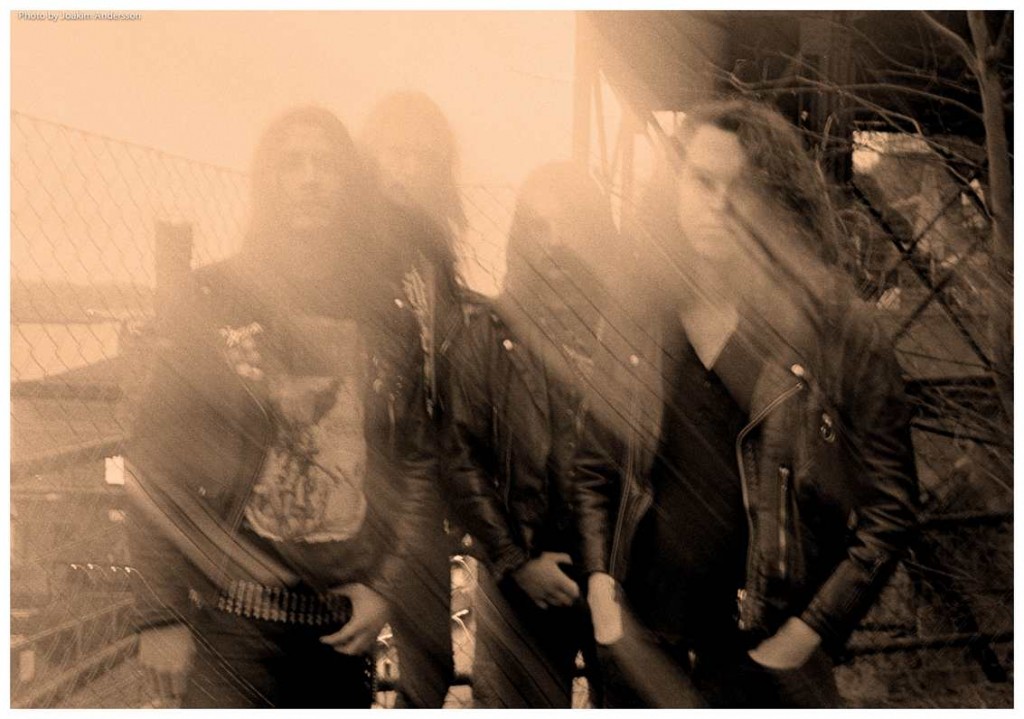
I write without vocal lines or lyrics in mind. They songs are all instrumentals until much later on. I often find myself struggling to fit words on there. Most of the time I think the vocals take away more than they add. So the general lack of vocals is because I’ve just used them when I thought they brought something to the track. I could write instrumental music, no problem. I rarely find myself in a situation where I’m not able to say everything I want through the music. But still, there are parts where the screams fill an important role. So they’ll always be there to some extent.
– On the other hand, anguish vocals resound like echoes from the underworld integrated in the whole atmosphere. Are vocals for you another instrument?
Yeah, you could say that. When the other instruments aren’t quite enough.
– Personally I think atmospheres are part of the «whole» this album is. A whole built with the lyrics, music, artwork… Is this something important for MORBUS CHRON? In fact once more for the art you have worked with Raúl González, so I guess he may understand this part of the band quite good.
We wanted to create something a bit more ambitious. Something that was connected in music, lyrics and art. A complete package. We started discussing ideas with Raul at a very early stage. Long before the recording had taken place. It was important to put time into every aspect of the album. Raul ended up doing a separate painting for each track, inspired by the lyrics. It’s really something else. Working like this is completely new for us though. But all the hard work is paying off.
– It also caught my attention the fact the tracks on the album are lengthier than ever. Is this way easier to develop this well-cared compositions, so diverse and with different contrasts and details?
Yeah, it’s not an album that could’ve been cut into three minute tracks. It wouldn’t have worked any other way.
– Here guitars stand out a lot, they have a great technique, interesting progressions and different nuances, and there are also more Black Metal style riffs. In fact I could highlight the riffs on a lot of tracks; from the accoustic passages of «Terminus» to the more BM oriented ones on «Towards a Dark Sky», or that psychedelic vibe on «The Perennial Link». What could you comment on the aforementioned tunes?
When I wrote Terminus and wasn’t sure at all if it would work for the band. I don’t think we’ve ever been so uncertain over a song. But in the context of the other songs and as a finisher, it wrapped up the album nicely. Towards a dark sky went through many different stages. It was one of those songs were things just kept being added. I see what you mean with the BM reference. The Perennial Link is just a big contrast. The beginning is heavy, but I wanted it to end on a completely different note. I think there’s a little bit of everything on most tracks. It’s hard to comment.
– In fact guitars aren’t really complex, but give that impression with discordant sounds, even though their basis are simple, but sound that way due to, as I said earlier, the weird structures. So, how did you approach the guitar work?
I’m actually a pretty terrible guitar player. I know about four chords and those I can’t even switch between smoothly. I don’t know a single scale and my playing technique is most likely completely wrong. I never actually played other bands material. Sure, I learnt a couple of Slayer intros and tried some Metallica songs, but very early on I started writing my own stuff and got better from writing harder riffs. That has led to me being pretty sucky at anything that you would think is common knowledge for a guitarist. But I’m still able to write pretty fucked up riffs. It’s most likely a big reason why we sound the way we do.
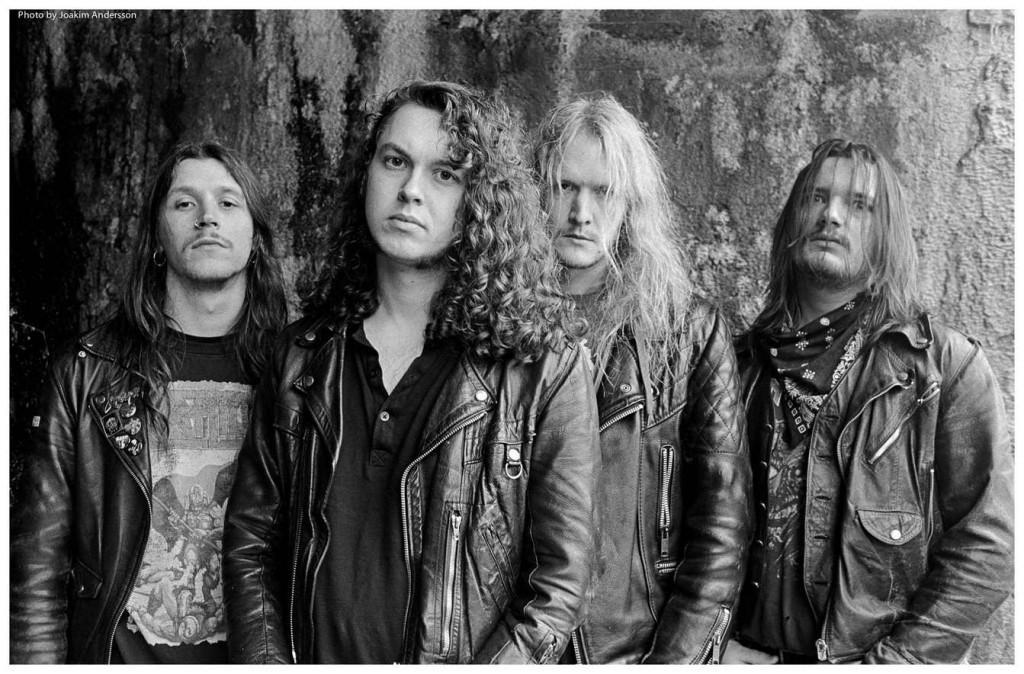 – Earlier I mentioned «Terminus», which ends the album on a superb way, both due to its great structures (really well-developed) as for its feeling, it gives the feeling its the end of a journey, of a dream. It’s like the awakening and, as with your previous releases, it leaves you wondering what would be the next. Is the order of the tracklist something you really care for? As all your albums end on a great way, like leaving a door open, like it’s not just the end, but also the beginning of something else.
– Earlier I mentioned «Terminus», which ends the album on a superb way, both due to its great structures (really well-developed) as for its feeling, it gives the feeling its the end of a journey, of a dream. It’s like the awakening and, as with your previous releases, it leaves you wondering what would be the next. Is the order of the tracklist something you really care for? As all your albums end on a great way, like leaving a door open, like it’s not just the end, but also the beginning of something else.
Most importantly, we needed to have an introduction and a good bye. But when that was in order, it still wasn’t just a matter of having good material on both sides of the vinyl, it also needed to work as an album – a coherent piece of music. So it’s not just ten songs that randomly made sense together. It’s very thought through from beginning to end.
– The first track you have released off this new opus is «It Stretches the Hollow», which is a great description of this whole album, of its wide spectrum and great ambition. Why did you pick this song?
It felt like a good mix between the old and the new. Something that wasn’t too experimental or too safe.
– On the other hand, this new opus, as your EP, has been produced by Fred Estby, while your debut was produced by Nicke Andersson, two veterans. How has the whole process go with this second release with him? And how different it was compared to your debut album? As that one was recorded in just a few days, with no second takes.
I can assure you that there were second takes on the first album.. But the vocals were pretty much sung in one take. Working with Fred and Nicke isn’t so different. They have a similar workflow and taste in sound and music. So no overusing the digital tools and triggering drums. Sure, it took us a while longer compared to Sleepers. But there was more to the songs this time. Naturally we needed some extra days.
– All this about «Sweven» being said; how could you describe it in just 3 words?
Unorthodox Gangsta Rap
– And finally, what are now your near-future plans?
A short tour now in march and then some shows here in Sweden. There is some talk about future stuff, but that’s all I can say right now.
– That’s all, thank you once more for answering our questions. If you want to add some final words; feel free to do it.
It was my pleasure. Thanks for the interview! // Robba
